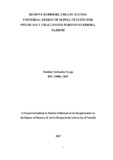| dc.contributor.author | Nyaga, Dominic G | |
| dc.date.accessioned | 2017-12-01T08:17:11Z | |
| dc.date.available | 2017-12-01T08:17:11Z | |
| dc.date.issued | 2017 | |
| dc.identifier.uri | http://hdl.handle.net/11295/101456 | |
| dc.description.abstract | Universal Design (UD) is a concept, approach, or goal to make products and the built environment universally usable by all people everywhere. UD proposes a collaborative systems approach that benefits from the synergies of cross-functionalism by approaching the diverse challenges facing society through socially responsible design. This research addresses the universal design access challenges, associated with M-Pesa Outlets in the city of Nairobi, Kenya. The research was based in Nairobi, Kenya and was limited to the physically disabled at Kibera Locality M-Pesa Outlets. A case study approach adopted in this research allowed for gathering of qualitative data which was used to develop context-sensitive design outcomes. The case used was of select Safaricom(K) M-pesa outlets in Kibera and its environs in Nairobi county, Kenya.. Twenty participants were interviewed during the fieldwork. These included two key informants from the Kibera locality, five interior designers and contractors, seven agents of the M-Pesa outlets and five persons with disabilities. An interview with the head interior designer of the Safaricom(K) M-pesa shops also provided contextual background on designing for the physically challenged. Semi-structured interviews were undertaken through a qualitative approach and the guiding questions for the interviews were divided into two sections. The first section focused on the access challenges encountered by persons with disabilities (PWDs) in these M-Pesa Outlets, while the second section of the questions focused on the role of universal design and access in integrating the disabled in Points of Sales (POS) spaces. This research sought to propose methods that ensure Universal Design Principles are incorporated in the design of M-Pesa Outlet facilities in Kenya to contribute towards the reduction of stigma and discrimination associated with needs of PWDs. From the findings the researcher was able to propose a framework that would be used as a guide when designing small retail outlets accessible to all guided by Universal Design Principles. | en_US |
| dc.language.iso | en | en_US |
| dc.publisher | University of Nairobi | en_US |
| dc.rights | Attribution-NonCommercial-NoDerivs 3.0 United States | * |
| dc.rights.uri | http://creativecommons.org/licenses/by-nc-nd/3.0/us/ | * |
| dc.subject | Universal Design of M-pesa Outlets for Physically Challenged Persons | en_US |
| dc.title | Remove Barriers, Create Access: Universal Design of M-pesa Outlets for Physically Challenged Persons in Kibera, Nairobi | en_US |
| dc.type | Thesis | en_US |



